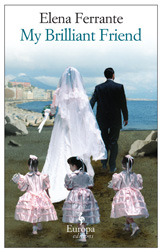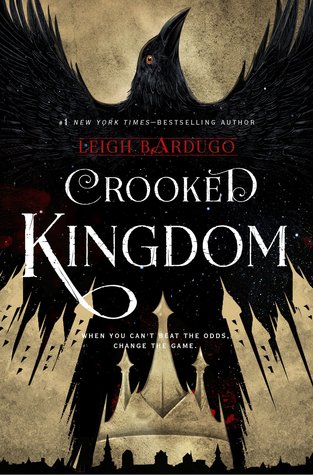I often seem to find myself thinking about the connections between books I read right around the same time (the English teacher side of me calls this making "text-to-text connections"). Sometimes the connections are obvious because the books are very similar (like when I read two books by the same author with the same setting and themes within a few weeks of each other), but sometimes the books are completely different in every way and the only reason my brain picks up on a connection is because it was already thinking about the theme or topic from a book I just finished reading (for instance, when I connected a rambling memoir about a young woman with a foreign novel about an old man because they were both clearly introverts).
This happened to me recently, with an even more bizarre pairing: a literary foreign novel about friendship, and an action-packed fantasy novel with a heist twist. You guys, Elena Ferrante's My Brilliant Friend and Leigh Bardugo's Crooked Kingdom could not be more different, but while I was reading the latter, I couldn't stop thinking about the themes of poverty and violence, mostly because those were such big themes in My Brilliant Friend, and therefore it was on the mind.
Violence is not something I spend a lot of time thinking about, I guess because I live a lucky and privileged life in which I've had very little exposure to real violence. Once, when I was in kindergarten, a boy I didn't know very well came over for a play date (our mothers were friends), and he proved to be a bit rougher of a playmate than my sisters and other girl friends were. I think he was pretending to be a ninja or something, and at one point in the game he punched me hard in the chest. I was shocked because it was the first time in my life I'd ever been hit like that. It was also the last. (Except for that one time when my then-boyfriend now-husband accidentally punched me in the nose while he was putting on a sweatshirt and forcing his arm through the sleeve and I was standing a little too close. It was clearly unintentional, but I still like to rag him about that moment.)
So I found the violence in My Brilliant Friend to be shocking not because it was so brutal or graphic (it wasn't particularly), but because it was so commonly accepted as part of life. For context, this book takes place in one of the poorer slum neighborhoods of Naples, Italy some time after the end of WWII. So we're talking a mostly first world country during peace time within living memory. There is one murder in the book, and that was considered a shocking scandal, but beating up your wife and children? Fairly standard and accepted practice. Any insult at all, from man or woman, could be defended with violence. There are several descriptions of awful street fights, gang beatings, even "respectable" wives and mothers hurling insults and curses along with objects at their neighbors out the windows.
In general I do not think of Italians as being a violent people, at least not more so than any other Western European culture or country. And yet the slums of this Italian city display the same pattern of accepted violence I found while reading about the slums of a fictional city in a fantasy world far removed from Naples. And so I found myself asking, what makes violence a part of any culture? Is it a lack of money? The lack of access to basic resources that reduces humans to their basic "fight or flight" survival instincts?
Or is it a lack of education?
One of the more striking scenes in My Brilliant Friend is when Lila, at the time a small and slender and barely fourteen-year-old girl, pulls a knife and vulgarly threatens a much older and stronger boy who had been harassing her. This is such a striking scene because Lila is quite brilliant, a voracious reader and natural scholar, but despite her knowledge and brilliance, this moment emphasizes how thoroughly she has come to accept and participate in the culture of her neighborhood. She answers violence with violence, and the narrator insinuates she would not have hesitated to kill this boy if she'd needed to.
The entire book is actually a commentary on how education (or the lack thereof) perpetuates the violent culture of this poor neighborhood. Lila is naturally brilliant, and excels at school, but when she is not allowed to continue to middle school or high school, she redirects her brilliance into dominating the sphere she inhabits. She fully invests in her slum neighborhood, not seeking to leave it, but to rule over it. She endures physical abuse from her brother and father, giving as good as she gets. She redirects her intelligence from academic pursuits to street smarts, and uses her beauty and body to gain influence in her community. She rises within her sphere, but not above it.
In contrast, Elena does continue on to middle school and high school, enjoying great academic success, but increasingly finding herself more and more unconnected with the neighborhood culture around her. Elena develops a skill, unusual in her neighborhood, for resolving disagreements through words and diplomatic arguments. Lila comes to rely on Elena to use her words to pacify and persuade others, to unify instead of divide. Elena's education allows her to glimpse and engage with a world beyond her neighborhood, and to understand that there is another way to live, another way to interact with people.
Crooked Kingdom clearly illustrates that wealth and access to resources does not preclude humans from perpetrating horrible acts of violence. But My Brilliant Friend seems to hint that education, at least a specific type of education, does allow individuals to break free from the cycle of violent poverty. Both Lila and Elena were brilliant in their own way, but Elena was the one who learned how to use words instead of her body to fight, and that is how she rose above the slums.
In the end it was Elena's mastery over language and ideas, her ability to reason and write and speak persuasively, that ultimately allowed her to break free. I believe this provides insight into humanity as a whole. We have our instincts, we have our natural tendency to "fight or flight". But, unlike any other animal on earth, we also have language. We have the ability to communicate our feelings, our motivations, our desires, to other humans. And with that ability to communicate comes the potential to be understood. When we understand each other, we no longer need to fight each other.
I love reading books that make me think deeply, and My Brilliant Friend, while perhaps not the most enjoyable of books, was certainly one of those. But I also love when books I think I'm reading for pure entertainment value (Crooked Kingdom) also contain hidden gems of insight into human nature. I love even more when books as disparate as these two can complement and enrich each other, helping distill and crystallize ideas I wouldn't have had without reading both. It's such wonderful serendipity.
Have you ever had a similar experience of making connections between two seemingly unrelated books?



No comments:
Post a Comment